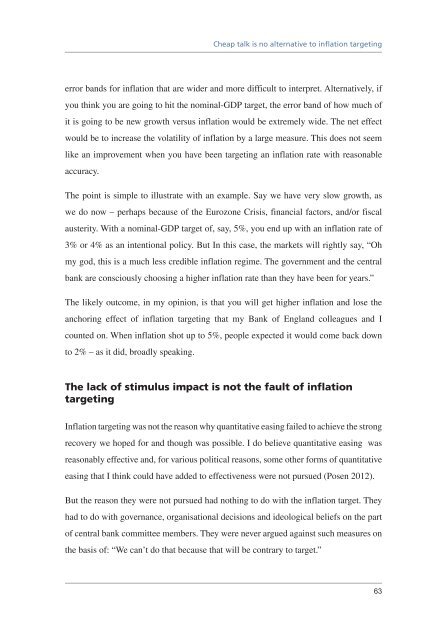Is inflation targeting dead? Central Banking After the Crisis - Vox
Is inflation targeting dead? Central Banking After the Crisis - Vox
Is inflation targeting dead? Central Banking After the Crisis - Vox
You also want an ePaper? Increase the reach of your titles
YUMPU automatically turns print PDFs into web optimized ePapers that Google loves.
Cheap talk is no alternative to <strong>inflation</strong> <strong>targeting</strong>error bands for <strong>inflation</strong> that are wider and more difficult to interpret. Alternatively, ifyou think you are going to hit <strong>the</strong> nominal-GDP target, <strong>the</strong> error band of how much ofit is going to be new growth versus <strong>inflation</strong> would be extremely wide. The net effectwould be to increase <strong>the</strong> volatility of <strong>inflation</strong> by a large measure. This does not seemlike an improvement when you have been <strong>targeting</strong> an <strong>inflation</strong> rate with reasonableaccuracy.The point is simple to illustrate with an example. Say we have very slow growth, aswe do now – perhaps because of <strong>the</strong> Eurozone <strong>Crisis</strong>, financial factors, and/or fiscalausterity. With a nominal-GDP target of, say, 5%, you end up with an <strong>inflation</strong> rate of3% or 4% as an intentional policy. But In this case, <strong>the</strong> markets will rightly say, “Ohmy god, this is a much less credible <strong>inflation</strong> regime. The government and <strong>the</strong> centralbank are consciously choosing a higher <strong>inflation</strong> rate than <strong>the</strong>y have been for years.”The likely outcome, in my opinion, is that you will get higher <strong>inflation</strong> and lose <strong>the</strong>anchoring effect of <strong>inflation</strong> <strong>targeting</strong> that my Bank of England colleagues and Icounted on. When <strong>inflation</strong> shot up to 5%, people expected it would come back downto 2% – as it did, broadly speaking.The lack of stimulus impact is not <strong>the</strong> fault of <strong>inflation</strong><strong>targeting</strong>Inflation <strong>targeting</strong> was not <strong>the</strong> reason why quantitative easing failed to achieve <strong>the</strong> strongrecovery we hoped for and though was possible. I do believe quantitative easing wasreasonably effective and, for various political reasons, some o<strong>the</strong>r forms of quantitativeeasing that I think could have added to effectiveness were not pursued (Posen 2012).But <strong>the</strong> reason <strong>the</strong>y were not pursued had nothing to do with <strong>the</strong> <strong>inflation</strong> target. Theyhad to do with governance, organisational decisions and ideological beliefs on <strong>the</strong> partof central bank committee members. They were never argued against such measures on<strong>the</strong> basis of: “We can’t do that because that will be contrary to target.”63














